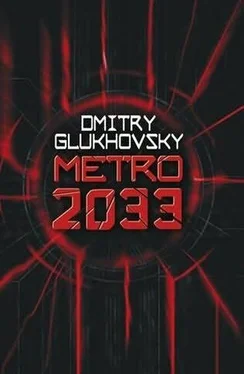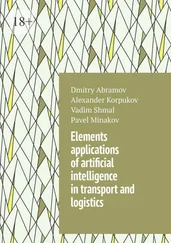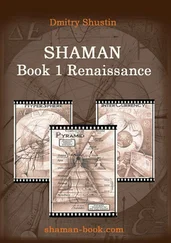‘You don’t know? That’s his favourite catchphrase – the one about the rats the size of pigs. He’s a comedian, you see,’ Artyom responded. ‘So what’s new with you? What have you heard from the boys?’
Zhenya’s friends were traders, delivering teas and pork to the market at Prospect Mir. They brought back multivitamins, cloth, all sorts of junk, sometimes they even got hold of oil; sometimes they’d bring dirt-stained books, often with pages missing, which had mysteriously ended up at Prospect Mir, having travelled through half the metro system, passing from one trunk to the next, from one pocket to the next, from one merchant to another, before finally finding their rightful owners.
At VDNKh, they were proud of the fact that, despite their distance from the centre and the main trade routes, the settlers there were able not just to survive conditions that worsened every day, but to maintain, at least within the station, human culture, which was quickly dying out underground.
The administration of the station had strived to give this issue as much attention as possible. It was mandatory to teach children to read, and the station even had its own small library, to which all the books that they managed to acquire at markets were added. The problem was that the traders didn’t really choose the books, they just brought what they were given and they collected it as though it was scrap paper.
But the attitude of the people at the station towards books was such that they wouldn’t rip even one page out of the silliest pulp fiction. People revered books as though they were relics, as a final reminder of the wonderful world that had sunk into oblivion. Adults, who held sacred every second of a memoir they read, transferred this love of books to their children, who had nothing to remember of the other world and only knew the endlessly intersecting and gloomy tunnels, corridors and passages.
In the metro there were just a few places where the written word was idolized like this, and the inhabitants of VDNKh considered themselves to be one of the last strongholds of culture, the northern-most post of civilization on the Kaluzhsko-Rizhskoi line. Artyom also read books and Zhenya did too. Zhenya awaited the return of his friends from the market and when they arrived he would rush up to them to ask if they’d brought anything new. And so, books almost always got into Zhenya’s hands first, and then they went to the library.
Artyom’s stepfather brought him books from his expeditions and they had almost a whole bookshelf of books in their tent. The books lay on the shelf, yellowing and sometimes a little gnawed by mould and rats, sometimes sprinkled with brown specks of blood. They had things that no one else had, at the station and perhaps in the whole metro system: Marquez, Kafka, Borges, Vian, and some Russian classics.
‘The guys didn’t bring anything this time,’ said Zhenya. ‘Lekha says that there will be a load of books coming soon from a guy in Polis. He promised to bring a couple here.’
‘I’m not talking about books!’ Artyom waved Zhenya away. ‘But what have you heard? What’s the situation?’
‘The situation? Nothing it seems. There are all sorts of rumours, of course, but that’s no different than usual – you know yourself that the traders can’t survive without their gossip and stories. They’d wither straight away if you didn’t feed them a few rumours. But whether you should believe their rubbish is another question. It looks as though all’s quiet. If you compare it with the times when the Hansa was at war with the Reds, that is. But wait!’ He remembered something. ‘On Prospect Mir they have forbidden the sale of weed. Now, if they find any weed on a trader, they will confiscate it all and will chuck him out of the station and put it on his record too. If they find any on you a second time, Lekha says that they won’t let you into Hansa for a few years. And that’s death to a trader.’
‘Come on! What – they’ve just forbidden it? What are they thinking?’
‘They say that they decided that it’s a drug since it affects the way you see things. And that your brain starts to corrode if you take it too often. They’re, like, doing it for health reasons.’
‘They should take care of their own health! Why are they worrying about ours all of a sudden?’
‘You know what?’ Zhenya said in a low voice. ‘Lekha says that they’re putting out all sorts of misinfo about things that are bad for your health.’
‘What misinfo?’ Artyom asked, surprised.
‘Misinformation. Here, listen. Lekha once went along the line, past Prospect Mir. He made it to Sukharevskaya. He was doing some dark business – wouldn’t even say what it was. And there he met an interesting old guy. A magician.’
‘Who?’ Artyom couldn’t hold back and burst out laughing. ‘A magician? At Sukharevskaya? Come on, he’s having you on, your Lekha! And what, the magician gave him a magic wand? Or a stick that turns into a flower?’
‘You’re an idiot.’ Zhenya was offended. ‘You think you know it all? Just because you haven’t met a magician doesn’t mean there aren’t any. Do you believe in the mutants at Filevki?’
‘Who needs to believe? They’re there, and that’s pretty clear. My stepfather told me about them. But I’ve never heard anything about magicians.’
‘Even though I have a lot of respect for Sukhoi, I don’t think he knows everything in the whole world either. And maybe he wanted just to scare you. Basically, if you don’t want to hear about it then screw you.’
‘OK, OK, Zhenya, go ahead. It’s interesting anyway. Even if it sounds like…’
Artyom grinned.
‘OK. They were spending the night by the fire. No one, you know, lives permanently at Sukharevskaya. So the traders from other stations stop there because the Hansa authorities see them off from Prospect Mir after lights-out. And, well, the whole crowd hangs around there, various charlatans and thieves – they all stick to the traders. And various wanderers rest there too, before heading south. So, in the tunnels beyond Sukharevskaya, some kind of ruckus begins. Nobody lives there – not rats, not mutants, and the people that try to pass through those tunnels mostly disappear. Just disappear without a trace. Beyond Sukharevskaya, the next station is Turgenevskaya. It’s next to the Red Line: there was a passage to Chistye Prudi there, but the Reds have named it Kirov again. Some communist was called that they say… People were too afraid to live near that station. They walled up the passage. And now Turgenevskaya is there, empty. Abandoned. So the tunnel there – from Sukharevskaya to the nearest human settlement is a long way. And it’s there that people disappear. If people go one by one, then they almost certainly don’t make it through. But if they go in a caravan of more than ten people, then they get through. And it’s nothing, they say, just a normal tunnel, clean, quiet, empty, and there aren’t any side passages, and there doesn’t seem to be anywhere to disappear to… Not a soul, not a sound, not a beast to be seen… And then, the next day, someone will hear about it, that it’s clean and easy, and they’ll spit on the superstition and go into the tunnel alone – and then, peek-a-boo. Now you see him, now you don’t.’
‘You were saying something about a magician,’ Artyom quietly reminded him.
‘I’m getting to the magician. Wait a minute,’ Zhenya said. ‘So, here you have it, people are afraid to go alone through this tunnel to the south. And they look for companions at Sukharevskaya so they can go through together. And if there’s not a market day then there aren’t many people and sometimes they have to wait days and weeks until there’re enough people to set off. So: the more people, the safer. Lekha says that you sometimes meet really interesting people there. There are plenty of wastrels there too, and you have to know how to differentiate between them. But sometimes you’re lucky. So, Lekha meets this magician there. It’s not what you think, not some Hottabych that comes out of a lamp…’
Читать дальше











